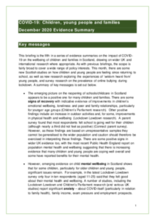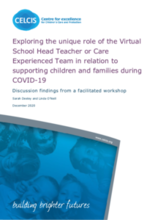

Displaying 361 - 370 of 1646
This article explores birth parents’ views on their needs and perceptions of support delivered by two different interventions: one offering support to individuals and the other providing a parental group.
This article compares the needs and background characteristics of children who became looked after by an English local authority between April and July in 2019 and the same three months in 2020, with the aim of identifying any impact of the Covid-19 pandemic which broke out in March 2020 and continued for some months thereafter.
This article presents a case study of a young man who participated in the Mission Mentoring Programme - an innovative scheme that supports council employees to become mentors for looked after children - and found it helpful for his transition to adulthood and intended employment.
The present study focuses on experiences of relational tensions and management strategies in family relationships among 18 young adults with foster care backgrounds who participated in interviews.
"Denmark's prime minister has apologised to 22 children who were removed from their homes in Greenland in the 1950s in a failed social experiment," says this article from BBC News.
For this study, responses from 311 students in out‐of‐home care (OHC) were compared with peers living in birth parent care (BPC) and in single birth parent care (sBPC) in a regional school survey, directed to students in compulsory school eighth year and upper secondary school second year.
"In the middle of the last century, thousands of students from African countries were studying at Irish universities. Some had children outside marriage, who were then placed in one of Ireland's notorious mother and baby homes. Today these children, now adults, are searching for their families," according to this article from BBC News.
This briefing is the fifth in a series of evidence summaries on the impact of COVID-19 on the wellbeing of children and families in Scotland, drawing on wider UK and international research where appropriate.
In October 2020 CELCIS convened and facilitated a virtual workshop with the Virtual School Head Teacher (VSHT) and Care Experienced Team (CET) network. Network members were asked two questions for consideration prior to the meeting. This document contains the key themes arising from question two: Did the VSHT/CET network have an impact on supporting you in your role during lockdown? What, if any, impact did being part of the network have for the children and young people that you have responsibility for?
In October 2020 CELCIS convened and facilitated a virtual workshop with the Virtual School Head Teacher (VSHT) and Care Experienced Team (CET) network. Network members were asked two questions for consideration prior to the meeting. This document contains the key themes arising from question one: Why did having your specific role within your local authority make a difference to care experienced children and young people during lockdown?



